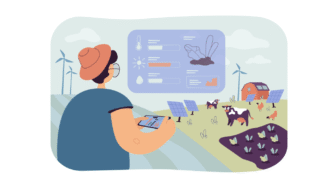LESSON OVERVIEW
The main objectives of this lesson are to:
- talk about global power dynamics;
- practise vocabulary for discussing geopolitical issues;
- watch a video on rare elements essential for high tech manufacturing.
With this lesson, students discuss the concepts of ‘superpower’ and ‘bloc’. They share their opinions on global power dynamics, talk about countries’ geopolitical standing and watch a video about rare earth elements. Students also work on vocabulary for discussing global influence and resources (e.g. obscure, plentiful, dispersed, etc.) and talk about addressing global challenges.
WARM-UP AND VIDEO
This lesson begins with a warm-up. Students read definitions and name two countries they consider superpowers and two groups of countries they consider blocs. After that, they choose the words in statements about opinions on global power dynamics which they think are correct and briefly explain their ideas. Next, students look at factors that contribute to a country’s geopolitical standing (e.g. military strength, demographic power, political stability, etc.). They assess their country’s geopolitical standing by discussing some of the factors. Afterwards, students watch a video about rare earth elements and summarize it in two sentences. Following that, they practise vocabulary for discussing geopolitical issues. Students look at statements from the video and complete gaps with synonyms of words in brackets (e.g. indispensable, impose, prompted, etc.). Some first and last letters are provided. Then, students watch the video again and check their answers.
DISCUSSION
At this point in the lesson, students discuss rare earths, global influence and strategic advantages. Then, they practise more vocabulary for discussing geopolitical issues. Students complete gaps in statements on global political concerns with the correct forms of words in brackets (e.g. contention, hegemonic, dependent, etc.). Afterwards, they choose three statements and talk about some examples which prove they might be true or untrue. Following that, students read questions (e.g. Which might be a safer place: an interdependent world or a world reliant on one superpower?) and choose the answer they think makes more sense to each of them. They also explain their reasoning. Finally, students discuss some ideas to enhance international cooperation and address global challenges (e.g. Military alliances should be abolished.). They talk about the likelihood of them happening, their implications and whether they think they should be implemented.
HOMEWORK/REVISION
This lesson plan also includes an additional task that you can use as homework or revision. In the task, students read a word and choose the sentence where it fits. Then, they think of a different word for the other sentence. The task is available in the teacher’s version of the worksheet. You can print it and hand it out to your students. It’s also included in the e-lesson plan.
WORKSHEETS
Subscribe to unlock these and many other Standalone lesson lesson plans with the Unlimited plan
Subscribe











Great worksheet!
Thanks!
Good worksheet, surprising that a worksheet about politics is very neutral when so many of the worksheets on this website are incredibly politically biased. Well done.
For example which ones?
Nice class. This is a great topic. Are there any other classes related to geopolitics?
Thanks! Yes, there is also the lesson Understanding war through game theory.